
English (Global)
Article
Common Types of High Temperature Thermal Insulation for the Industrial Sector
Learn more about the different types of high temperature thermal insulation available in the NUTEC portfolio, to benefit from greater efficiency and avoid heat losses in your processes.
What is high temperature Industrial Thermal Insulation?
Industrial high temperature thermal insulation aims to minimize heat transfer between surfaces or environments with different temperatures. In industrial settings, its implementation is essential to optimize energy consumption, reduce operating costs, and enhance both worker safety and comfort.
Beyond energy optimization, proper insulation helps maintain stable operating conditions, protect equipment, and prevent heat loss in critical processes.
By controlling thermal flow, effective insulation supports optimal performance while minimizing unnecessary energy consumption. However, due to the wide variety of available materials and solutions, it is essential to have a guide that helps select the right product for each specific application.
In this article, you'll explore the range of high-temperature insulation products, their industrial applications, and key recommendations for proper installation and use.
Benefits of industrial high temperature Thermal Insulation
Energy savings and cost reduction
- Implementing an effective insulation system can offer energy savings of up to 50% with a return on investment period of between 6 and 12 months.
- Furthermore, most high-quality insulation solutions last for many years, leading to continuous cost savings.
Enhanced operational efficiency
- Poor insulation can lead to multiple operational problems.
- On the one hand, overheating and equipment malfunction can result in unscheduled shutdowns. On the other hand, inconsistent temperatures cause variations in product quality and increased waste.
- Good insulation ensures thermal stability, operational continuity, and more efficient processes.
Safety and regulatory compliance
- By mitigating the risk of burns and other accidents related to high temperatures, fiber insulation provides an effective barrier that protects workers and the work environment.
- The proper installation of thermal insulation not only protects against high temperatures but also helps prevent the spread of fire in the event of a blaze.
- This is especially important in industrial environments where the risk of fire can be high due to the presence of heat-generating equipment and processes.
Sustainability
- By reducing the use of fossil fuels, it helps minimize the environmental footprint.
- At NUTEC, we have implemented ecological practices at every stage of our manufacturing process.
- We focus on reducing our carbon footprint and minimizing waste, ensuring that our products are truly environmentally friendly and user-friendly. All this is achieved without compromising the quality of our wide range of thermal insulating products.
- We offer a wide selection of low biopersistence fiber thermal insulation, among which we can mention SuperMag LD 1900, SuperMag 2200, SuperMag HI 2200, SuperPly 2200, SuperMag LD 2300, MG 1400, MG 1900, and MaxBlock modules.
The Importance of high temperature Thermal Insulation in the Industrial Sector
Industrial high temperature thermal insulation plays a critical role in ensuring efficient, safe, and sustainable operations in industrial facilities. It’s not just about heat retention or energy savings — it’s about optimizing the performance and integrity of every system.
In industries such as steel, petrochemicals, power generation, or ceramics, systems often run at extreme temperatures. Without proper insulation, heat loss, safety risks, equipment wear, and energy costs rise significantly.
By implementing thermal solutions like NUTEC’s blankets, modules, boards, or vacuum-formed shapes, companies can:
- Significantly reduce energy consumption by minimizing conductive heat losses.
- Improve process efficiency by maintaining stable thermal conditions in furnaces, boilers, and reactors.
- Protect personnel, preventing exposure to dangerously hot surfaces.
- Lower environmental impact by reducing fossil fuel consumption and associated emissions.
- Extend equipment lifespan by avoiding thermal stress and premature failure.
In short, thermal insulation is not optional — it’s a strategic asset that supports productivity, safety, profitability, and environmental responsibility in today’s industry.
Key factors for choosing the right industrial high temperature thermal insulation
When selecting a high temperature thermal insulation system for industrial use, it is essential to evaluate a series of key factors. Below are some of the critical aspects to consider during the selection process.
1. Operating temperature range:
Ensure the insulation is rated for the actual temperature requirements of your process. NUTEC offers products capable of withstanding temperatures ranging from 2012 °F to 3000°F, making them suitable for both medium- and high-temperature industrial environments.
2. Compatibility with equipment and process type:
Assess whether the insulation will be applied to flat surfaces, curved areas, moving parts, or equipment subject to vibration. NUTEC’s product formats—modules, blankets, boards, and shaped components—are designed for maximum adaptability.
3. Material quality and durability:
Opt for materials that provide thermal, mechanical, and chemical resistance to ensure long-term performance under harsh industrial conditions.
4. Specialized technical support:
A reliable supplier should offer expert guidance from design to installation. NUTEC provides technical support to help you select the most efficient solution for your operation.
5. Ease of installation and maintenance:
Modular or pre-engineered systems can significantly reduce installation time and downtime costs, especially in scheduled shutdowns or environments with difficult access.
6. Sustainability and regulatory compliance:
It is essential to consider the specific regulations required by each industry and country. At NUTEC, we offer a variety of products designed to meet the industry's most stringent standards and regulations.
7. Global coverage and reach:
Choose a supplier with international presence and logistics capabilities. NUTEC operates manufacturing facilities in Mexico, the United States, and Europe, enabling us to support industrial-scale projects with fast and reliable delivery.
8. Technical support and expert teams:
Having a technical team that understands your process is essential. NUTEC provides specialized support, from engineering to installation, with experts ready to ensure optimal performance and precision at every step.
9. Needs assessment and project follow-up:
Every industrial project has unique challenges. A good partner provides tailored solutions. NUTEC supports your operation from the initial assessment through full project execution with dedicated attention.
10. Assured quality:
Mechanical strength, thermal stability, and long-term performance all depend on material quality. NUTEC’s products are manufactured to strict international standards, delivering consistent and reliable results in extreme environments.
What are the main applications of high temperature thermal insulation in various industries?
High-temperature thermal insulation is crucial for maintaining efficiency, safety, and reliability across various industrial sectors.
Its applications range from sectors with high thermal demand, such as steel, aluminum, and petrochemicals, to specialized industries like aerospace, automotive, ceramics, construction, power generation, and appliances.
Some examples include:
Aerospace Industry
- Thermal shields
- Cryogenic insulation
- Cable covers
- Fire protection in electrical systems
- Engine blades and gaskets
- Fuel tanks and fuselages
Appliances
- Boilers and water heaters
- Dryers, fryers, stoves, and ovens
- Microwaves
- Electric, gas, and wood fireplaces
- Thermal barriers
Automotive
- Catalytic converters
- Exhaust systems
- Batteries and electrical modules
- Oil and fuel filtration
- Friction materials
- Heat shields and gaskets
Construction and Fire Protection
- Electrical conduits and precast structures
- Fire-rated systems and doors
- Chimneys
- Grease ducts and vents
Ceramics and Glass
- Kiln walls and roofs
- Kiln cars and seals
- Regenerators
- Melting and annealing furnaces
- Burner seals
Petrochemical and Refining
- Pyrolysis furnaces and reformers
- High-temperature piping
- Crude heaters
- Expansion joints and seals
At NUTEC, we engineer insulation solutions that fit your industry’s toughest challenges. Let’s talk about how we can help you boost thermal performance where it matters most.
Classifying the different types of high temperature insulation products
As you can see in this previous article, high temperature insulating products are used in applications that can exceed 2910°F (1600°C). Depending on your application, they come in various product formulations and chemistries/temperatures. Three main categories are freely available on the market:
- Refractory Ceramic Fiber. This fiber is a blend of alumina and silica, capable of withstanding temperatures up to 2300°F (1260°C). Adding zirconia to this fiber allows temperatures up to 2600°F (1425°C).
- Low Biopersistent Fiber. Also known as biosoluble fibers, LBP consists of a chemical composition of calcium, silica, and magnesium. It is suitable for temperatures up to 2190°F (1200°C).
- Polycrystalline Fiber. With a chemical composition of polycrystalline mullite, this fiber offers high tensile strength, durability, and minimal shrinkage at elevated temperatures. It can be used for temperatures up to 3000°F (1650°C).
Insulation materials possess common features such as low thermal conductivity, low heat storage, high tensile strength, thermal shock resistance, sound absorption, and being asbestos-free.
Below is a list of the most common forms of industrial high temperature thermal insulating materials you’ll find in the NUTEC portfolio for industrial use:
- Blankets
- Boards
- Bulk & Engineered Fiber
- Papers
- Modules
- Coatings and Mixes
- Vacuum-Formed Shapes
Blankets
Insulation blankets are a versatile and widely used solution in the industrial sector. They comprise fibrous mechanically needled products to create an efficient thermal barrier.
By trapping air pockets between the fibers, insulation blankets effectively reduce heat transfer. They are commonly used in HVAC (Heating, Ventilation, and Air Conditioning) walls, ceilings, pipes, and ductwork due to their flexibility, ease of installation, and ability to provide comprehensive coverage, thus promoting energy efficiency.
For high temperature applications, ceramic fiber blankets are extensively employed both inside and outside industrial furnaces. These blankets exhibit exceptional heat resistance, withstanding temperatures ranging from 2190°F (1200°C) to 3000°F (1650°C). Furthermore, due to their adaptable form, they can be easily cut, shaped, and used in conjunction with other products.
Pro Tip: NUTEC insulation fiber blankets offer hassle-free installation, requiring no curing or dry-out time. They enable rapid heat-up, and their outstanding thermal shock resistance ensures they will not crack or spall under extreme conditions.
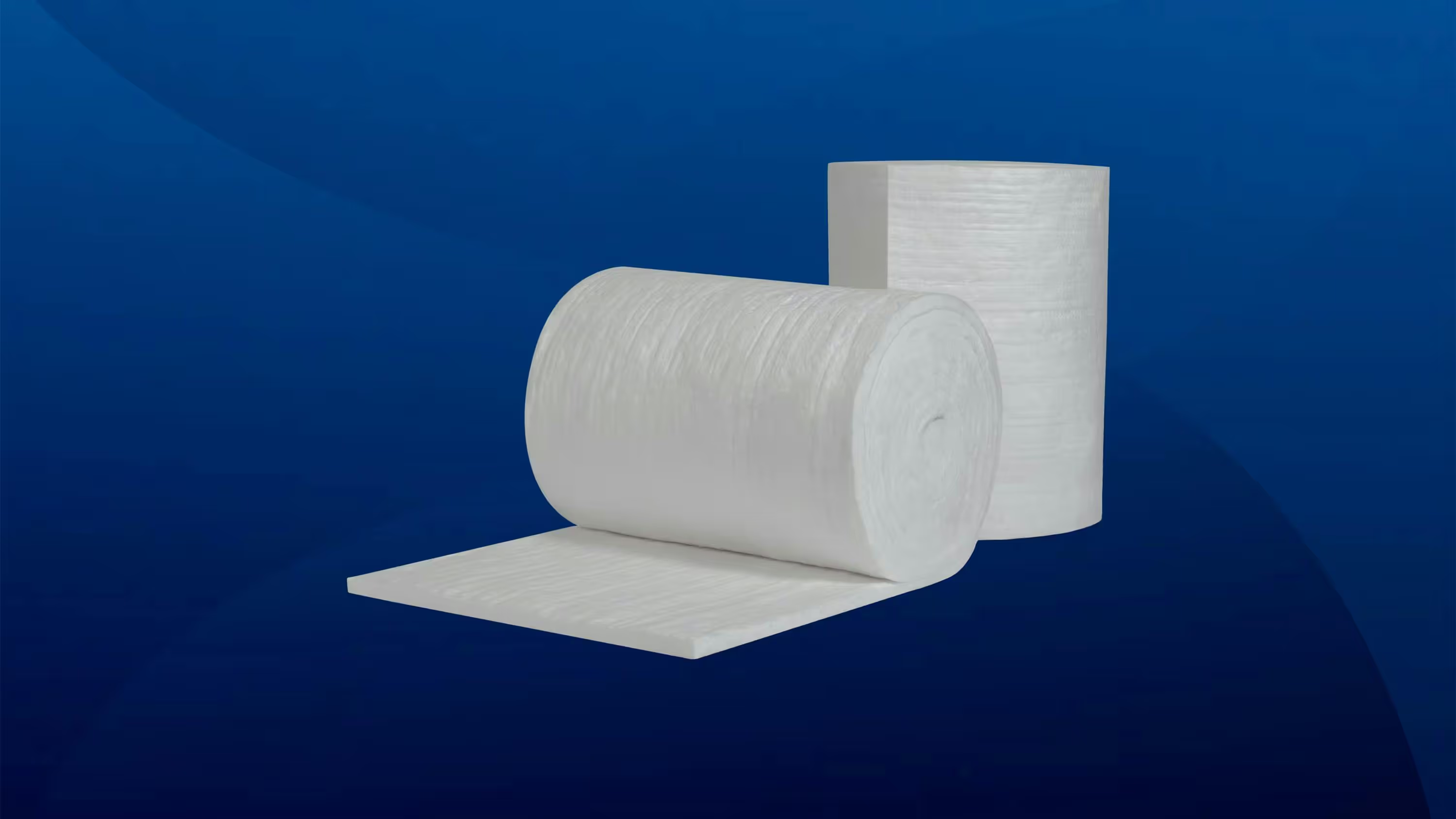
Boards
Panel insulation offers a durable and robust solution designed to withstand demanding conditions. It is manufactured through a vacuum-forming process, creating lightweight yet sturdy panels that excel in industrial applications.
The panels’ ability to resist air velocity, high vibrations, erosive forces, and mechanical stresses is a direct result of their forming process. This unique construction enables them to handle extremely high temperatures and endure harsh conditions, effectively serving as a solid barrier that minimizes heat transfer.
Two types of fibers are commonly used: Refractory Ceramic Fibers (RCF) and Low Biopersistence Fibers (LBP). These boards can withstand temperatures ranging from 2010°F (1100°C) to 3000°F (1650°C). You can find more information about their specific characteristics here.
Pro Tip: These vacuum-formed boards are specifically engineered to be strong, rigid, self-supporting, and highly resistant to high velocities, vibrations, erosive forces, and mechanical stresses.
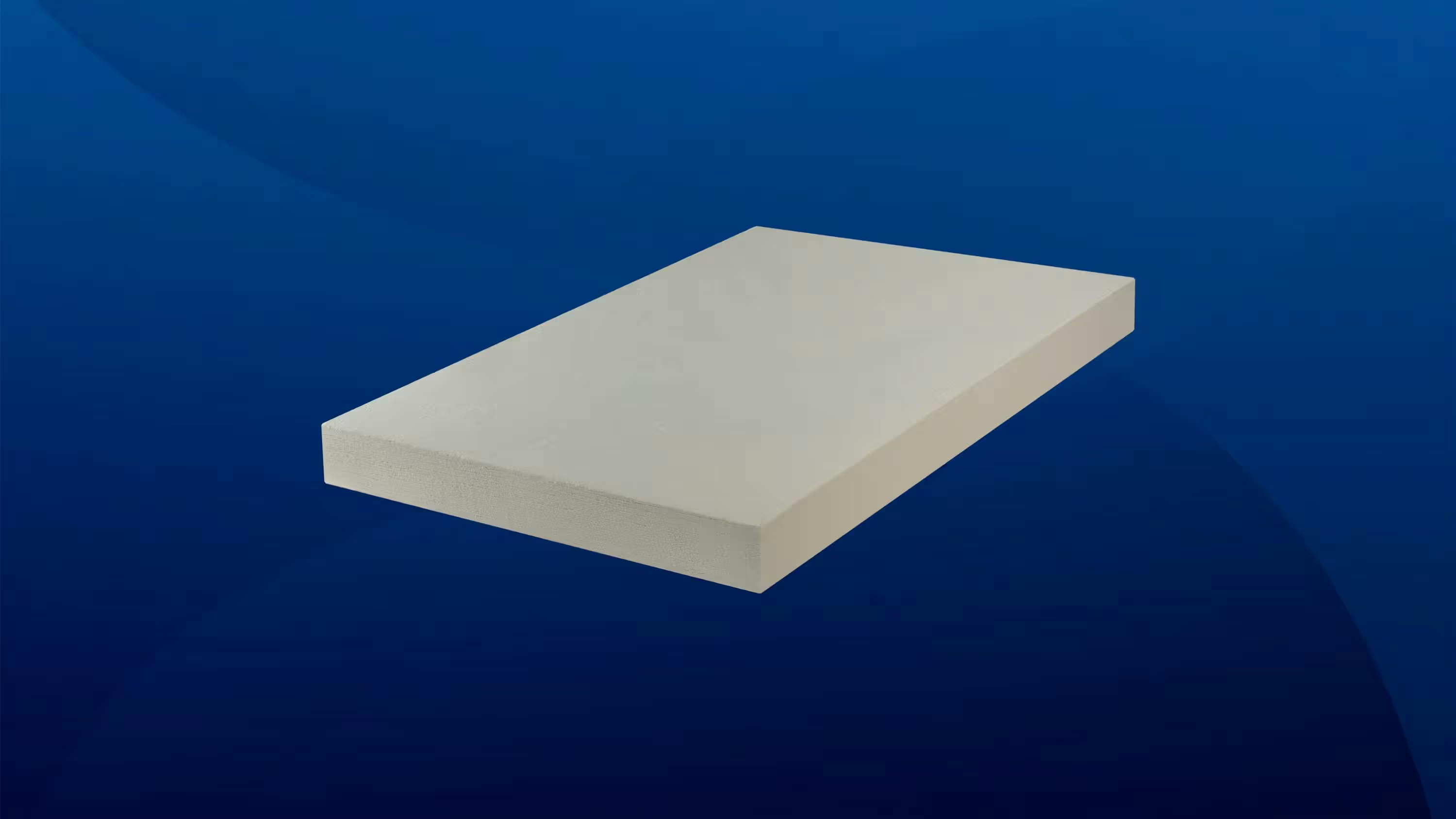
Bulk and Engineering Fiber
These high temperature thermal insulation solutions are used in many industrial applications, and are made by melting high-purity alumina and silica as raw materials. Bulk fibers serve as the basis for various products, including moldable pieces and ceramic fiber boards.
When working with bulk fiber, it is crucial to wear personal protective equipment (PPE) and follow proper safety precautions to prevent inhalation of loose particles that may be released into the air.
It is noteworthy that these bulk fibers and engineering fibers exhibit exceptional temperature resistance, withstanding temperatures ranging from 2190°F (1200°C) to 3000°F (1650°C).
You can find more information about the main features and applications of these solutions here.
Pro Tip: A broad range of high temperature fibers is available, designed for a variety of industrial and commercial applications, including vacuum-formed products, friction materials, coatings, and cements.
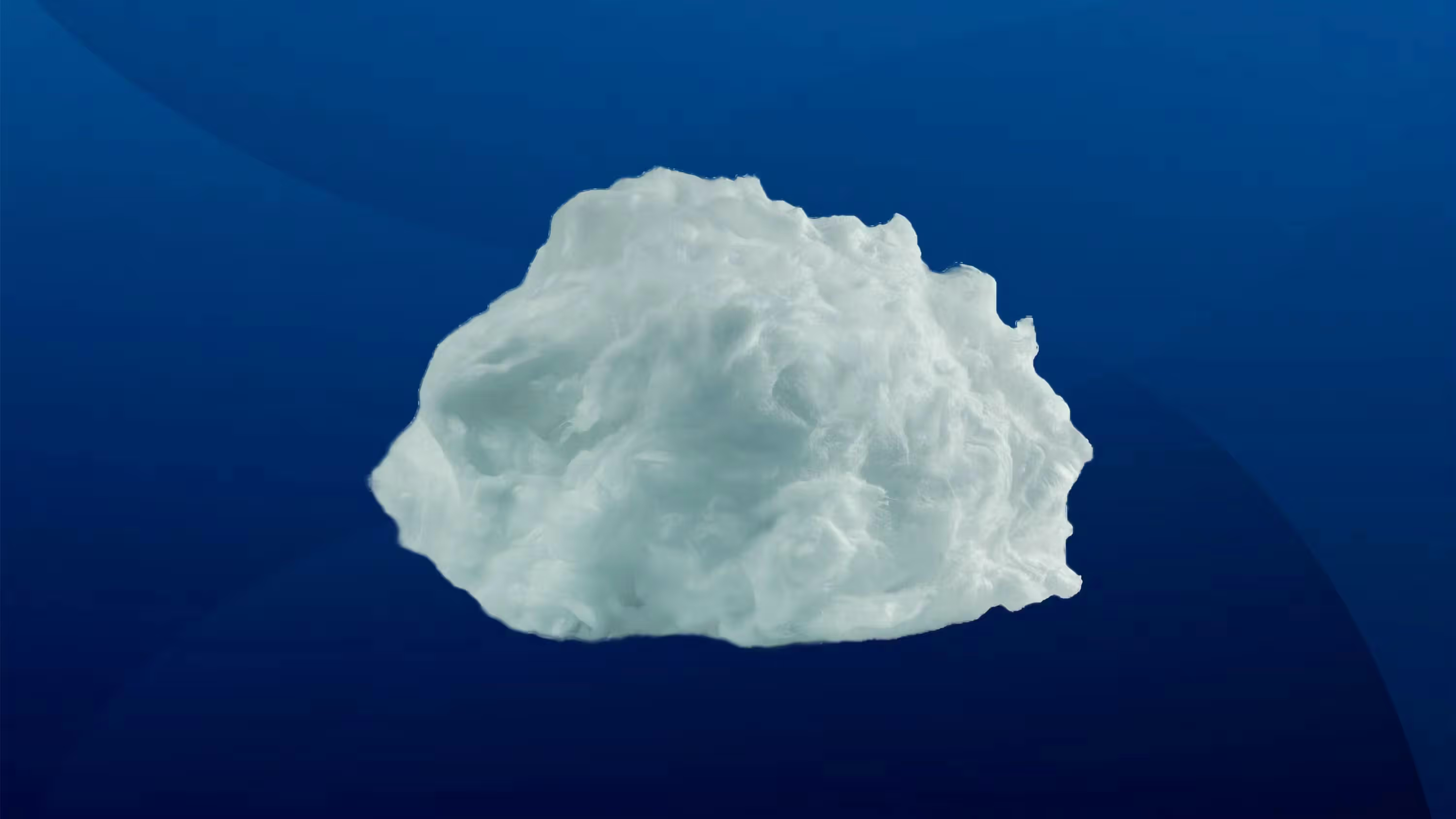
Papers
For creating insulating paper, the fibers are woven together through different manufacturing methods. This product combines high temperature stability with extremely low thermal conductivity, making it ideal for applications requiring thin, lightweight, resistant materials.
While durable, they can be cut with utility knives, scissors, or standard box cutters. Their characteristic flexibility allows them to be wrapped or rolled to conform to most shapes. Paper chemistry formulations include aluminosilicate or calcium magnesium silicate fibers of low biopersistence.
The papers can withstand temperatures from 2190°F (1200°C) to 2600°F (1425°C).
Pro tip: These insulating papers are commonly used throughout industry where thin, lightweight, high temperature materials are needed.
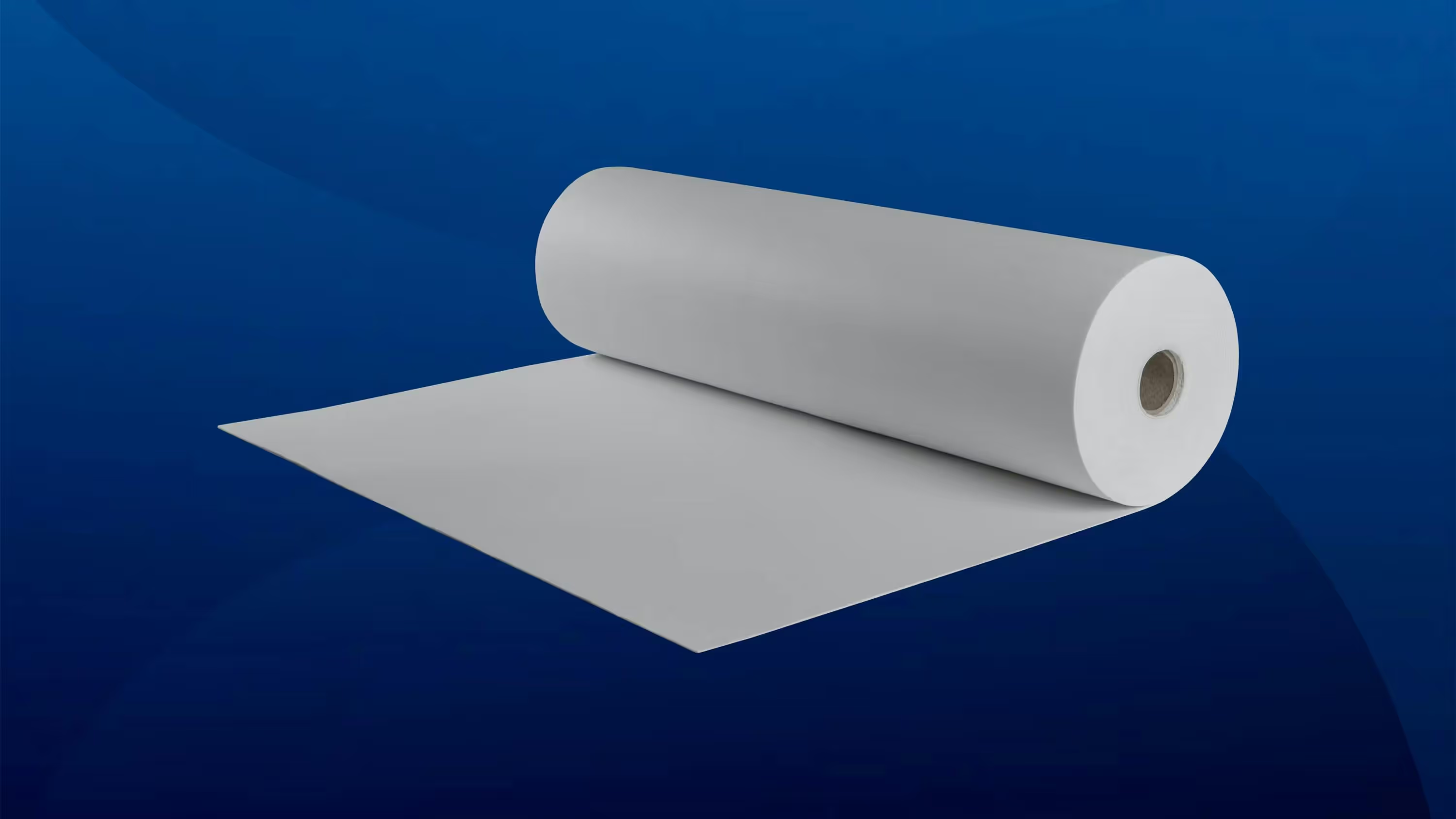
Modules
Modules are prefabricated. This means that can arrive at the installation site partially formed for further assembly, or in their final form ready for installation.
These modules are custom-made for use on industrial equipment, such as boilers, furnaces, and kilns, to provide thermal insulation up to 3000°F (1650°C). They are constructed using refractory ceramic fiber, polycrystalline wool, and low biopersistence fiber, which give them exceptional versatility.
Not only do these modules offer easy installation, but they also provide effective heat protection and maintain structural integrity under extreme conditions.
Pro tip: Explore our family of insulating modules, available in a variety of temperature grades and anchoring systems. Designed to be easily and quickly installed in high temperature furnaces and kilns.
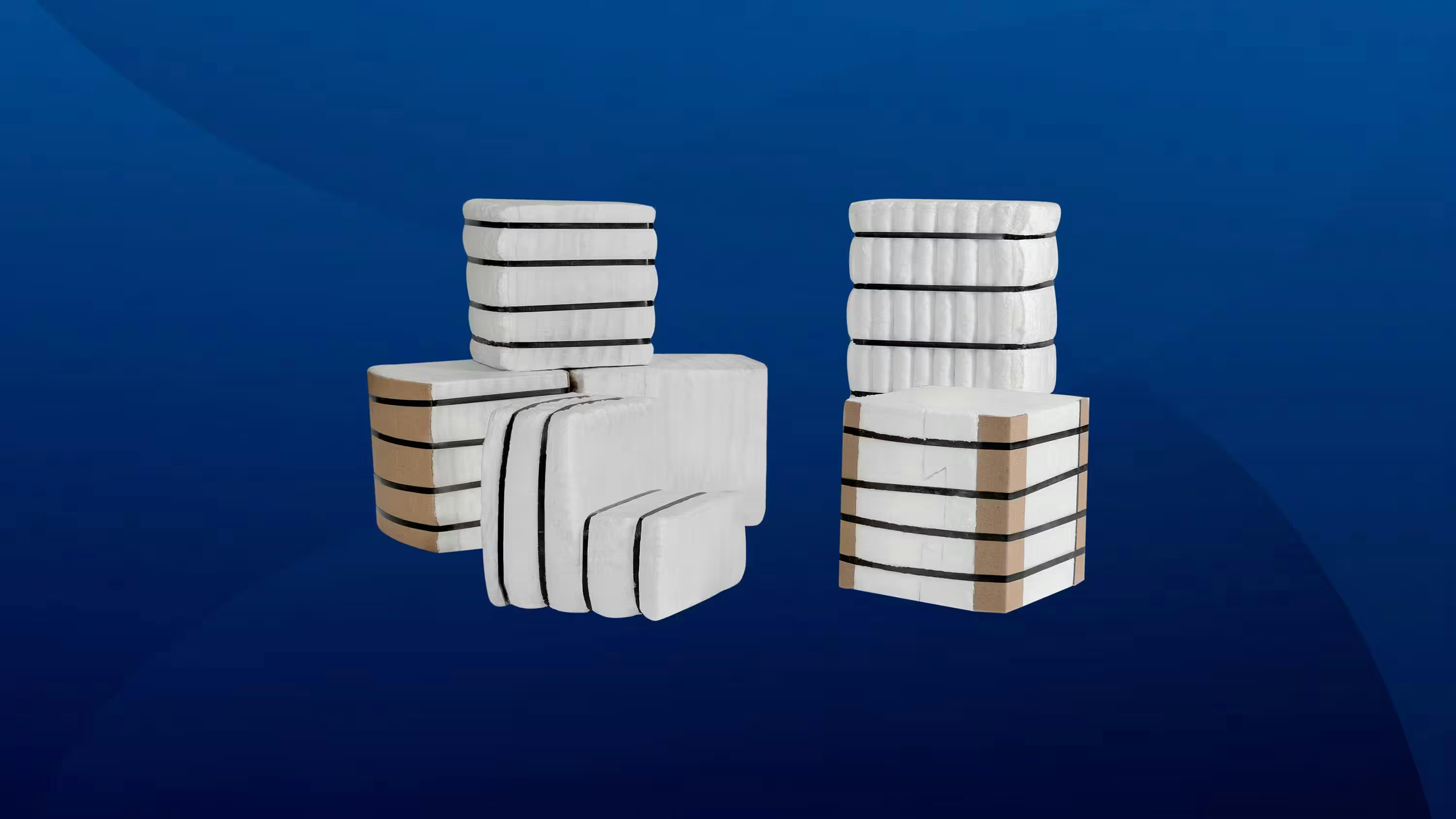
Coatings and Mixes
Insulating coatings and mixes are versatile solutions that can improve the energy efficiency and safety of industrial facilities. They can be used to protect metallic structures, high temperature pipes, and equipment exposed to extreme conditions.
By providing additional thermal protection, insulating coatings and mixes can help to reduce energy costs, prevent fires, and improve the safety of the workforce.
These products are multi-purpose, can withstand temperatures from 1900°F (1040°C) to 2700°F (1480°C), and are classified as follows:
- Moldable. Manufactured from a mixture of fibers and aluminosilicate binders. Their sticky, putty-like consistency adheres to ceramic fiber, refractory material, and steel. They are used to prevent heat loss caused by the deterioration of existing coatings.
- Pumpable. Ceramic fiber compounds are dispersed in a sticky mixture. They are fibrous, with excellent insulating properties, lightweight, and easy to install. Pumpable mixes and other ceramic fiber products have excellent wet adhesion to steel and refractories.
- Coatings. Used as ceramic fiber reinforcement that, after drying, will harden the product's surface to make it even more resistant. They are typically used in applications at constant exposure to accelerated gas movement or in contact with flames. They blend well with blankets, modules, or other high temperature insulation surfaces when applied by brushing or spraying.
Pro tip: A family of coatings, cement, mastics, and pumpable/moldable products with high temperature and thermal shock resistance, chemical stability, excellent insulating properties, and ease of installation.
Discover more ways to extend the lifespan of your thermal insulation in the following NUTEC article.
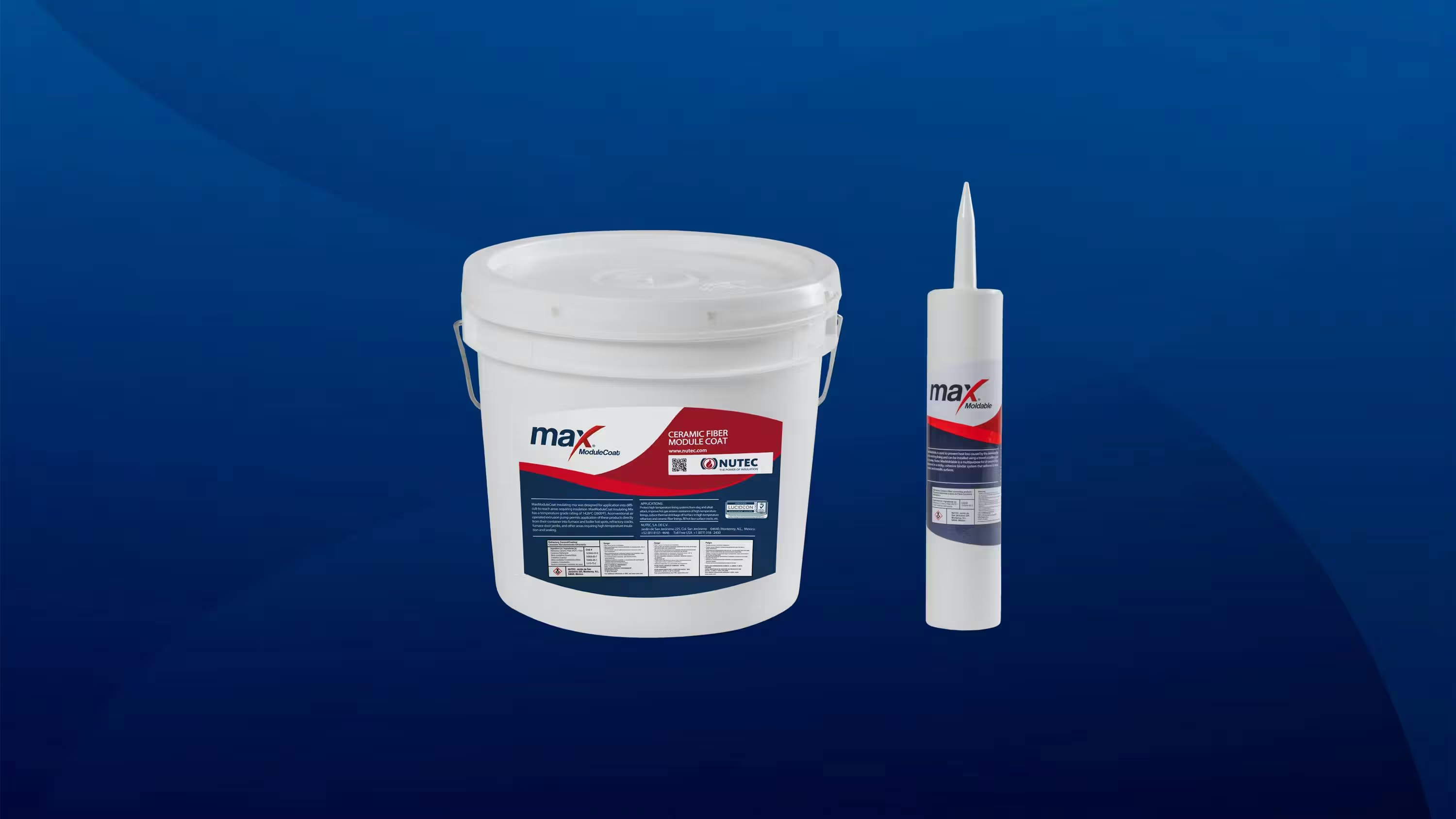
Vacuum-formed shapes
Vacuum forming is a wet forming process that uses different fiber types and binders to shape the wet product. Once formed, the product is dried and finished to meet the desired tolerances.
Vacuum-formed products can be produced with organic or inorganic (smoke-free) formulations, tailored to meet your specific product requirements. Special densities of vacuum-formed shapes can be provided upon request, and a wide range of shape configurations is available.
These products have been designed to withstand temperatures varying from 1830°F (1000°C) to 3000°F (1650°C).
Pro tip: Discover our extensive selection of specialized vacuum-formed shapes, engineered to withstand high velocities, while offering low thermal conductivity, minimal heat loss, and efficient heat storage.
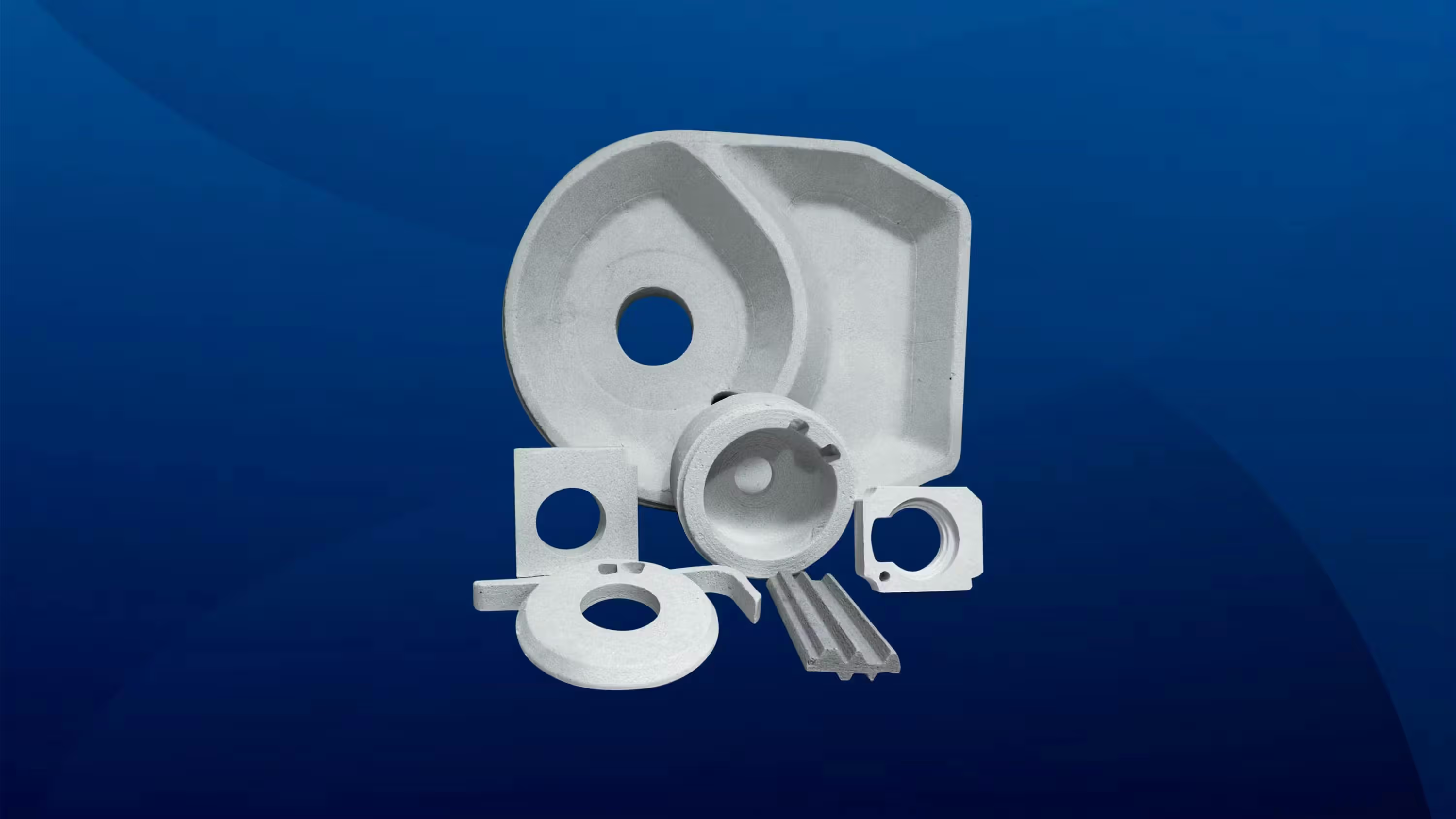
Textiles
Textile-based thermal insulation is available as clothes, ropes and braids. These products are manufactured from ceramic fibers.
Textiles are commonly used in industrial applications where custom insulation is required, such as removable covers, flexible conduits, or equipment wraps. They can withstand temperatures of 2300°F (1260°C).
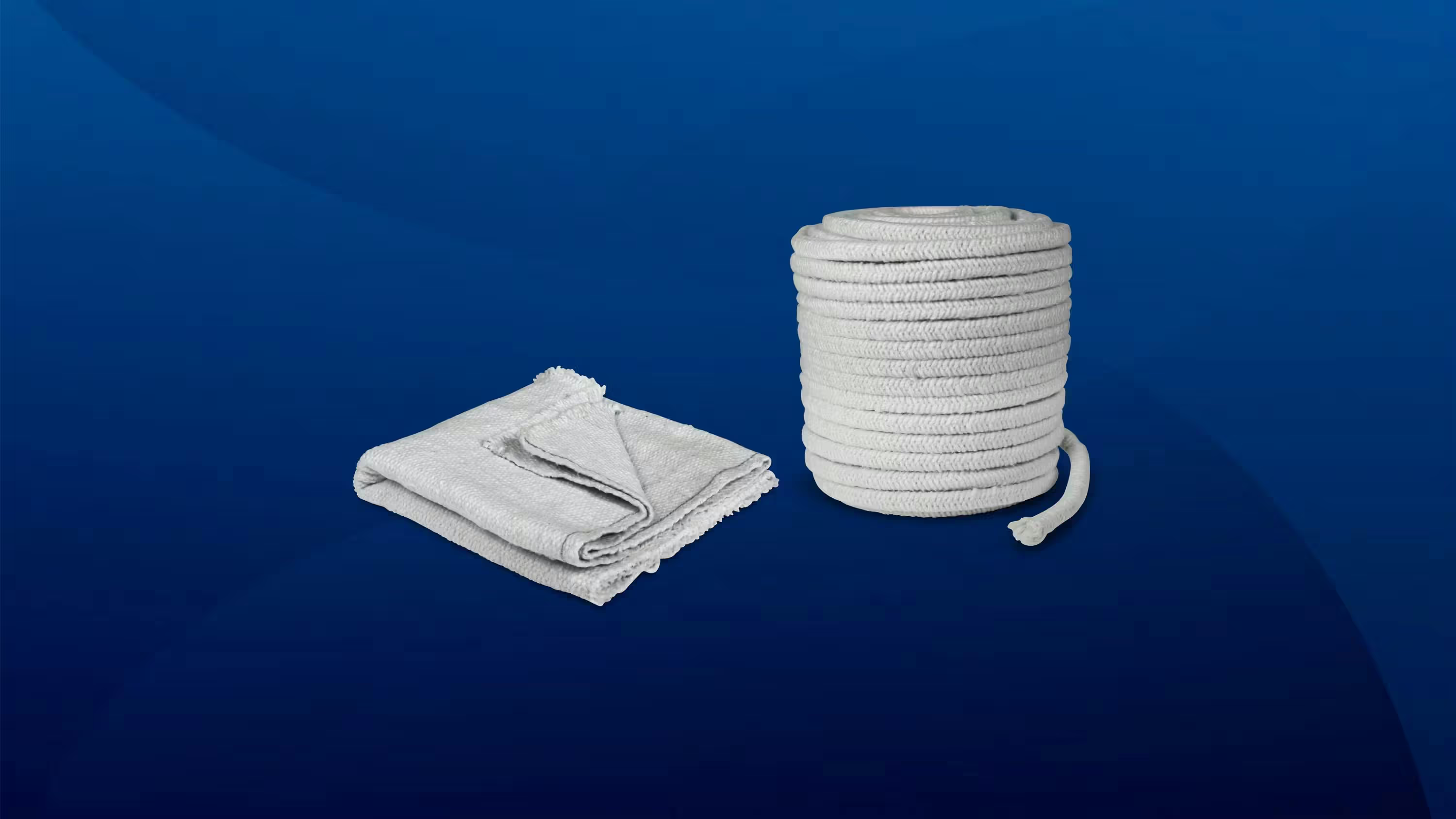
In conclusion
High temperature thermal insulation is a critical component in many industries, and with so many options available, it can be challenging to know which type is right for your needs.
This article can serve as a guide to help you make an informed decision and ensure you pick the most suitable material, saving you money in the long run.
If you need engineering solutions for high temperatures, contact us today.
Want to know more?
At NUTEC, we are committed to providing you with valuable content that helps you make informed decisions for your business. Thank you for taking the time to read this entry and we hope it provided you with insights that you can apply to your operations.
If you have any questions or would like to learn more about our products, please don’t hesitate to contact us.
To get in touch, simply fill out the form, and one of our experts will get back to you as soon as possible.
© NUTEC Incorporated 2026



